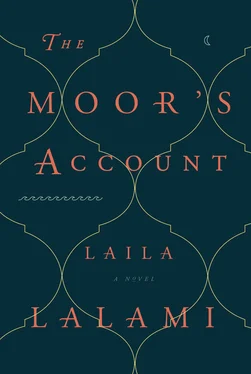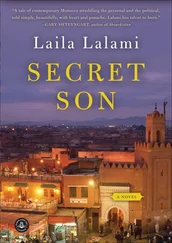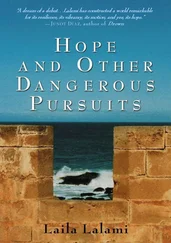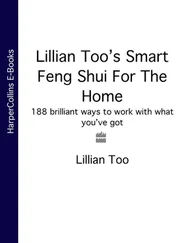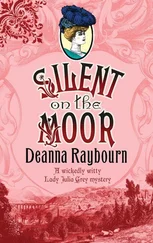The fierce Indians who dwell in these parts will be better disposed toward you if you are properly introduced. And your reputation will grow. This is how Cabeza de Vaca used to proceed.
The friar’s ambition wrestled with his doubt, but in the end ambition won. How will we communicate? he asked.
I had already thought of a way. I told him that I would go ahead of him to the next town and, as I proceeded, I would ask the Indians about the Seven Cities of Gold. If I heard or saw signs of them, I would send back a group of Amigos with a signal. If the land was poor, the signal would be a white cross the size of a hand. If it was rich, the signal would be a cross the size of two hands. If it was very rich, the signal would be a cross the size of an arm. And if it was richer than that, as rich as Tenochtitlán, then the signal would be a white cross the size of a man.
The friar agreed.
And now, free of him, I marched on. At each town my wife and I reached, I dispatched a set of Amigos, sending them back with a cross of decreasing size, until I had only ten of them left. When we arrived in the Indian town of Hawikuh, I sent back the remaining ten, giving them a cross the size of only one hand.
At last, I was free of the Amigos, who were not amigos. And my involvement with the empire was finally over.
With the sun nearly at its nadir, the sky had turned a light shade of amber. The breeze, still warm despite the late hour, diffused the scent of the wild flowers. I lay on the soft grass, with my head in Oyomasot’s lap and my ear pressed against the growing mound of her belly. If I stayed perfectly still, I could hear the faint heartbeat of our child. I had waited many years for that sound, for its promise of a new life. From the lake nearby came the croaking of the frogs and the singing of the crickets. It seemed to me as if the entire world were speaking to me, telling me that I was free now, free no matter what happened next, and a feeling of tranquility settled over me.
Listen, I said. Let me tell you a story that you can tell our child. I spoke to Oyomasot in her native language, a language I had had to learn in order to survive, a language that no longer felt alien on my tongue. She looked down at me then and her long hair brushed against my arm, making my skin break into bumps. There was a hint of curiosity in her eyes, but her face was otherwise untroubled and her features moved with grace.
The rays of the setting sun colored the walls of Hawikuh an orange color, the color of the gold that the servants of empire so desperately sought and so rarely renounced. Of all the places I had visited in the Land of the Indians, none looked to me so much like my hometown in Barbary, with its houses huddled together against the light. I thought of Azemmur in the spring, when the fig trees bloom and the fields are a sea of green and white. How I longed to see those fields again, to lie in them and listen to the humming of the bees, to swim in the Umm er-Rbi’ again, to sit on a boulder at the edge of the river and watch the shad swim against the current. How I longed to lay eyes upon my mother, to visit my father’s grave and whisper a prayer for his soul, to sit by my uncle’s side as he built chests or divans. How I longed to be woken in the morning by the call of the muezzin, to be tempted to go back to sleep, and then to feel my brothers’ hands gently shake me awake.
None of these things would be mine again, but if my destiny had been to travel west and see this vast, mysterious, beautiful land, perhaps it would be my child’s destiny to travel in the opposite direction and see my homeland, which will seem just as vast, just as mysterious, just as beautiful to him — or will it be her? In my mind, I could almost hear my childhood self intone, together with the other boys in the msid, our bodies moving forward and back to the rhythm of Qur’anic verses, that to God belong the east and the west. Whichever way you turn, there is the face of God.
This moment was perfect. It was all I had, and it was everything. I did not care for all the gifts that had been given to me along the way to Hawikuh — lapis, coral, turquoises by the purseload, pelts and furs. All I wanted was the freedom to lie here in the tall grass, under a darkening sky, with my wife beside me. On the other side of the town walls, Ahku, the cacique of the Zunis, was still appraising the news I had brought him and conferring with the tribe’s elders about what he should do.
That afternoon, when we arrived at his gates, Ahku came out to greet us. He was an older man and his hair was streaked with white, but he walked about with the posture and vigor of a youthful warrior. He was wrapped in a red blanket, tied with a bone clasp over his right shoulder. Behind him, three deputies stood, watching us with bare curiosity. Their headdresses were modest, made of plain strips of leather, but they wore many necklaces of coral and turquoise stacked together. None of them carried any weapons, for the town was fortified and well guarded.
Ahku led me into his lodge, a handsome, mud-brown edifice with white ladders angled against its walls, leading to the doorways of higher floors. A meal of roasted corn and baked beans was laid out for us in his receiving room, and we ate and conversed with great ease. But when I told him about the white men who were headed his way, he became concerned. What do they want? he asked.
Gold, I replied.
We have no gold.
I know. But they mean to conquer the country even if it has no gold. All of the territories south of here are already under their rule. They force people to till the land and those who refuse or fight them are branded rebels and killed wherever they go.
And how do you know this?
Because I lived with them. I came to this country with them.
Ahku ran a thumbnail on his lips, removing flecks of dry skin in one smooth stroke. His eyes traveled from me to my wife, and back again; I felt as if he were scrutinizing every gesture, every breath, every word. A servant brought a dish of roasted wild fowl and Ahku waited until we had taken a few bites before he spoke again. You said that these intruders are white, but you are black. How do you know so much about them? How do you know their ways or their intentions?
It is true that I look nothing like them, I said, but I speak their language and I have lived among them long enough to know what they mean to do. You must believe me.
Even if what you said is true, why did you come here? What do you stand to gain by warning us?
I gain nothing. I did not make the news, I merely tell it.
Ahku fell silent. He leaned back against the wall, thinking about everything I had said, but his face darkened as he reached his conclusions. Let the white men come if they wish, he said. We have fought intruders before, we can do it again.
At these words, his deputies nodded in agreement. The town of Hawikuh was not a settlement that could be taken without a fight, and they were prepared for it.
But they cannot be fought with weapons, I said. I explained to Ahku that the white men’s weapons were far more powerful than anything he had ever seen and that his only means of salvation was to create a fiction.
A story? Ahku asked.
Yes, I replied. Send a group of men, some bearing injuries of battle, to Vacapa. They can tell the friar Marco that the Zunis killed Estebanico.
Ahku laughed. Why do you want us to tell him we killed you? Do you think your tall tale is going to frighten this man away?
It was a tall tale that brought him here in the first place, I said. Nothing else, I was certain, would put a stop to Father Marco’s advance. I wanted the friar to go back to Coronado with the news that, not only had he found no gold in the northern territories, but the fierce Indians of Hawikuh had repelled his mission and killed Estebanico in the process. The servants of empire would forget about the Seven Cities of Gold. The people of Hawikuh would be safe. Estebanico would be laid to rest. But Mustafa would remain, free to live a life of his choosing.
Читать дальше
